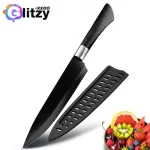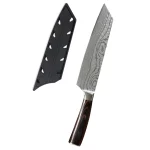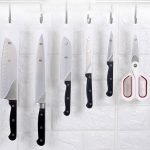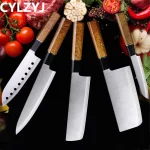In the realm of culinary craftsmanship, the knife is a chef’s most treasured possession. It’s the instrument through which they orchestrate symphonies of flavor, transforming raw ingredients into delectable dishes. Yet, like any prized possession, knives require dedicated care and attention to ensure they continue to perform at their best. Welcome to the art of knife care – a journey that will help you keep your blades gleaming and your culinary creations sublime.
The Significance of Proper Knife Care
Before we dive into the intricacies of knife care, let’s understand why it’s so vital. Properly cared for knives not only make cooking more enjoyable but also:
1. Enhance Safety
A sharp knife is a safer knife. Dull blades require more force, increasing the risk of accidents. A well-maintained knife ensures precise and controlled cutting.
2. Preserve Performance
A knife’s edge is its soul. Regular maintenance keeps the blade sharp, allowing it to effortlessly slice, dice, and chop through ingredients.
3. Extend Lifespan
Investing in quality knives can be costly, but with proper care, they can last a lifetime. This not only saves money but reduces waste.
4. Elevate Culinary Creations
A sharp knife gives you greater control, allowing you to execute intricate cuts and presentations that elevate your dishes to restaurant-quality standards.
The Essentials of Knife Care
Now that we’ve established why knife care matters, let’s explore the essential steps to keep your blades gleaming.
1. Regular Honing
Honing is the act of realigning the blade’s edge. Use a honing rod before or after each use to maintain sharpness.
2. Hand Washing
Avoid the dishwasher. Instead, wash your knives by hand with mild soap and warm water. Dry them immediately to prevent rust.
3. Safe Storage
Invest in a knife block, magnetic strip, or blade guard to keep your knives protected and organized.
4. Proper Cutting Surfaces
Use wooden or plastic cutting boards to reduce wear on your knives. Avoid cutting on hard surfaces like glass or stone.
5. Sharpening
Regularly sharpen your knives to maintain their cutting prowess. You can use whetstones or a professional sharpening service.
6. Handling with Care
Never use the knife’s edge to scrape food off the cutting board or hard surfaces. This can damage the blade.
7. Oil the Blade
For high-carbon steel knives, a light application of mineral oil can prevent rust and corrosion.
8. Store Dry
Before putting your knives away, make sure they are completely dry to prevent moisture-related damage.
9. Use the Right Knife for the Job
Different knives are designed for various tasks. Select the appropriate knife to prevent undue stress on the blade.
Troubleshooting Knife Problems
Even with meticulous care, knives may encounter issues. Here’s how to address common problems:
1. Rust Spots
Remove rust with a mixture of baking soda and water or a rust eraser. Prevent future rust by keeping knives dry.
2. Dull Blade
If honing doesn’t restore sharpness, it’s time for sharpening. Invest in quality sharpening tools or seek professional help.
3. Chipped Edge
Minor chips can often be honed out. For larger chips, consult a professional to avoid damaging the blade further.
Conclusion
The art of knife care is a culinary journey that every home cook should embark upon. By dedicating time and attention to your knives, you not only ensure their longevity but also elevate your cooking experience to new heights. Remember, a well-maintained knife is not just a kitchen tool; it’s a trusted companion that helps you craft culinary masterpieces.
So, sharpen that blade, oil that steel, and take pride in the gleam of your knives as you create delicious dishes that leave a lasting impression.






